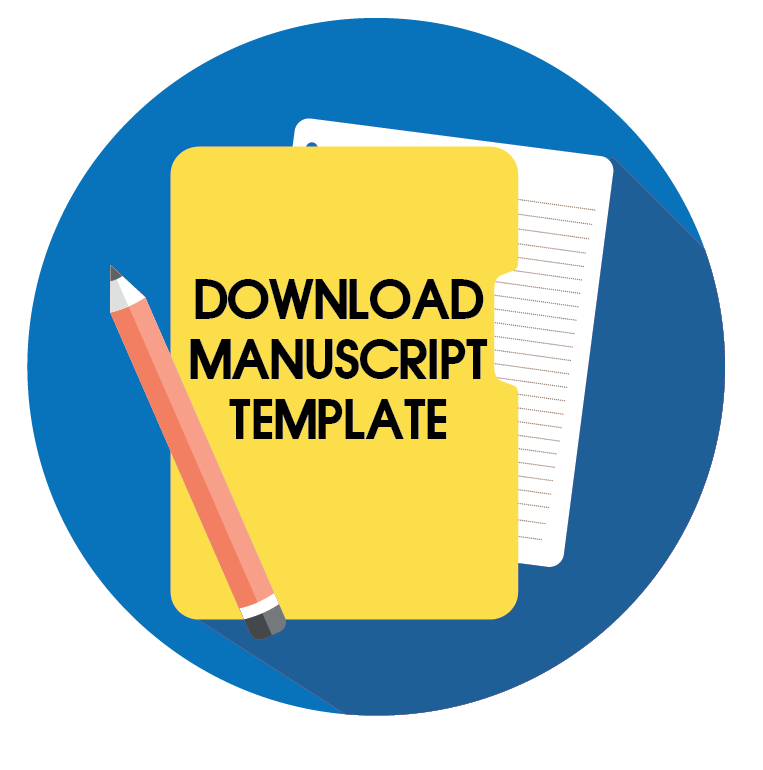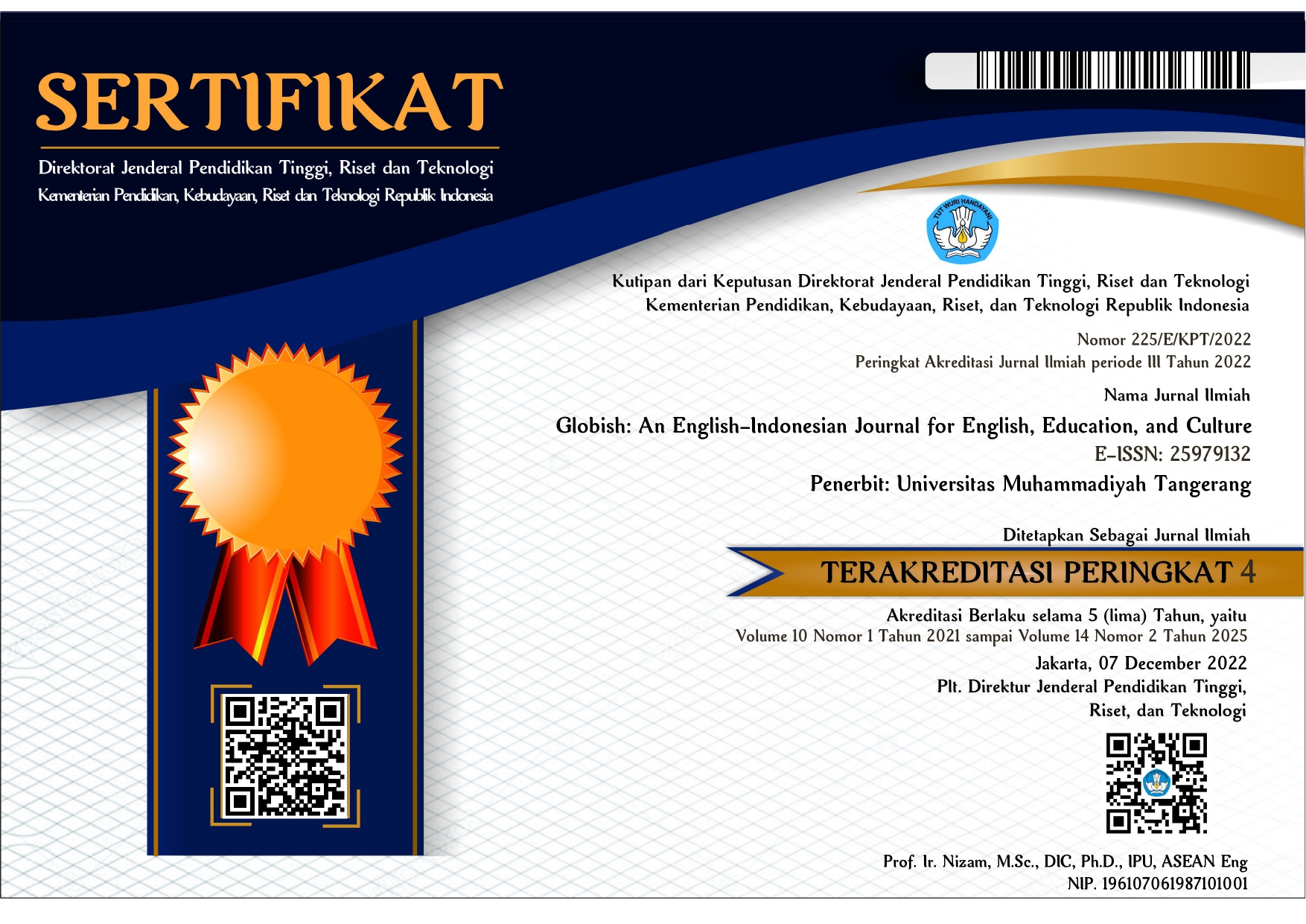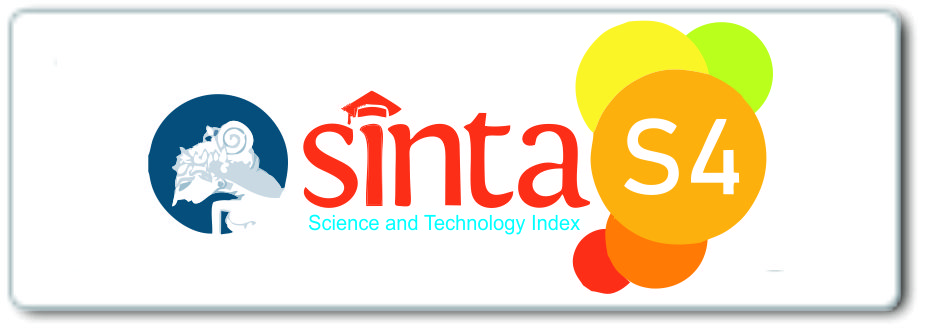The Evaluation of Academic Writing Courses Using CIPP Model
Abstract
One of the most challenging disciplines for university students is academic writing. According to this assertion, a number of thesis advisors voiced their displeasure with the writing abilities of the students, pointing out numerous errors in syntax, vocabulary, main concept development, and other areas. Thus, evaluation on Academic Writing course in necessary. The purpose of this research is to apply the CIPP (Context, Input, Process, Product) assessment model to assess the learning process of Academic Writing courses in a state university in Tangerang. The Miles and Hubberman data analysis and descriptive evaluative data approach of the qualitative research method was used. strategies for gathering data that involve Questionnaire fulfilment, document analysis and interviews. Result showed that Context, Input, and Product of Academic writing courses gained Strongly agree to the indicators meaning very good implementation, while the aspect of process gained Agree that means Good implementation. However, students and lecturer are recommended to focus on only in the product of writing but also in the process as there was indication of students’ over-relying on AI writing generator such as ChatGPT dan Perplexity.
Keywords
Full Text:
PDFReferences
Akbar, A., & Syamsurijal, S. (2023). Evaluation of online learning for PGSD study program students using the CIPP model. Riwayat: Educational Journal of History and Humanities, 6(2), 296-303. https://doi.org/10.24815/jr.v6i2.30163
Aryana, S., Burhanudin, M., Fauziya, D. S., & Wagiran, W. (2022). Evaluasi Pembelajaran daring mata Kuliah Bahasa Indonesia Menggunakan model context, input, process, product (CIPP). Indonesian Language Education and Literature, 7(2), 425. https://doi.org/10.24235/ileal.v7i2.10284
Aunurrahman, A., Hamied, F. A., & Emilia, E. (2017). Exploring the tertiary efl students' academic writing competencies. Indonesian Journal of Applied Linguistics, 7(1), 72. https://doi.org/10.17509/ijal.v7i1.6860
Binswanger, M. (2014). How nonsense became excellence: Forcing professors to publish. Incentives and Performance, 19-32. https://doi.org/10.1007/978-3-319-09785-5_2
Dinesh, K. (2021). A report on challenges faced by students and research scholars academic writing skill in English language. CHALLENGES IN ACADEMIC WRITING –A PRAGMATIC STUDY, 44-65. https://doi.org/10.26524/royal.54.3
Ghufron, M. A., & Saleh, M. (2016). Evaluating academic writing textbook: Teachers’ and students’ perspectives. Arab World English Journal, 7(1), 326-340. https://doi.org/10.24093/awej/vol7no1.19
Hasanudin, C., Wagiran, W., & Subyantoro, S. (2021). Evaluasi Perkuliahan daring Keterampilan Menulis selama masa Pandemi COVID-19 dengan model Evaluasi CIPP. Jurnal Pendidikan Edutama, 8(2), 27. https://doi.org/10.30734/jpe.v8i2.1784
Kamilia, F. F., Wahyudin, D., & Dewi, L. (2023). CIPP evaluation model: E-learning based life skills training. AIP Conference Proceedings. https://doi.org/10.1063/5.0111265
Kifta, D. A., Ambiyar, A., Rizal, F., & Islami, S. (2022). Evaluation of ISO 9001 lead auditor training program using CIPP model at ATS training centre. Jurnal Pendidikan Teknologi Kejuruan, 5(2), 41-46. https://doi.org/10.24036/jptk.v5i2.27323
Labibatussolihah, L., Adriani, N. M., Fathiraini, N., & Sumirat, Y. (2022). Historical empathy; The opportunities, reality, and challenges of online history learning in senior high school. PEDAGOGIK: Jurnal Pendidikan, 9(2), 126-143. https://doi.org/10.33650/pjp.v9i2.4589
Rahmi, A., & Sutantie, S. (2018). Development of talking chips basic learning model in a vocational high school (SMK) in Medan. Proceedings of the International Conference on Indonesian Technical Vocational Education and Association (APTEKINDO 2018). https://doi.org/10.2991/aptekindo-18.2018.51
Solihin, R. R., Susanto, T. T., Fauziyah, E. P., Yanti, N. V., & Ramadhania, A. P. (2024). The efforts of Indonesian government in increasing teacher quality based on PISA result in 2022: A literature review. Perspektif Ilmu Pendidikan, 38(1), 57-65. https://doi.org/10.21009/pip.381.6
Stufflebeam, D. L. (1983). The CIPP model for program evaluation. Evaluation Models, 117-141. https://doi.org/10.1007/978-94-009-6669-7_7
Sungha Lee, & Choi Myoungsook. (2016). Developing evaluation factors of college-level learning community program based on Stufflebeam's 7-CIPP evaluation model. The Korean Journal of Educational Methodology Studies, 28(3), 471-496. https://doi.org/10.17927/tkjems.2016.28.3.471
Surendran, S., & Saad, N. (2019). Evaluation of bachelor of education program: Cipp model as a basic. International Journal of Modern Trends in Social Sciences, 132-140. https://doi.org/10.35631/ijmtss.280013
Susan, Jafari., Mohsen, Shahrokhi. (2016). A CIPP Approach to Evaluation of Grammar Teaching Programs at Iranian High-schools: A Case Study. Journal of Applied Linguistics and Language Research.
Warju, W. (2016). Educational program evaluation using CIPP model. Innovation of Vocational Technology Education, 12(1). https://doi.org/10.17509/invotec.v12i1.4502
Zhou, M. (2023). Significance of assessment in learning: The role of educational assessment tools. Science Insights Education Frontiers, 18(2), 2881-2883. https://doi.org/10.15354/sief.23.co215
DOI: http://dx.doi.org/10.31000/globish.v14i1.11709
Article Metrics
Abstract - 1886 PDF - 692Refbacks
- There are currently no refbacks.
Globish
Program Studi Pendidikan Bahasa Inggris
Fakultas Keguruan dan Ilmu Pendidikan
Universitas Muhammadiyah Tangerang
Jl. Perintis Kemerdekaan I/33, Cikokol
Kota Tangerang, Indonesia
e-mail: globish_journal@umt.ac.id
Globish (p-ISSN: 2301-9913 | e-ISSN: 2301-9913) is licensed under a Creative Commons Attribution-ShareAlike 4.0 International License.









